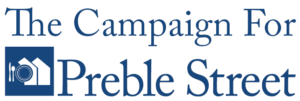
Our hearts are full – and the goal has been reached!
Preble Street is excited to share that The Campaign for Preble Street has raised more than $14 million from 650 donors to fund six initiatives that will meet critical needs and empower people and communities.
Preble Street received critical support for The Campaign through Leadership gifts from Unum, L.L.Bean, and Sara Gideon, as well as The Leon & Lisa Gorman Fund, Hawk Rock Foundation, Deborah Hart and Bill Goodykoontz, Morton-Kelly Charitable Trust, and the Sam L. Cohen Foundation.
During the Campaign’s quiet phase in 2019, the entire Preble Street board contributed generous gifts setting the stage for participation from a wide variety of individual, corporate, and foundation donors. Preble Street volunteers and longtime supporters also contributed several extraordinary gifts anonymously.
Thank you!
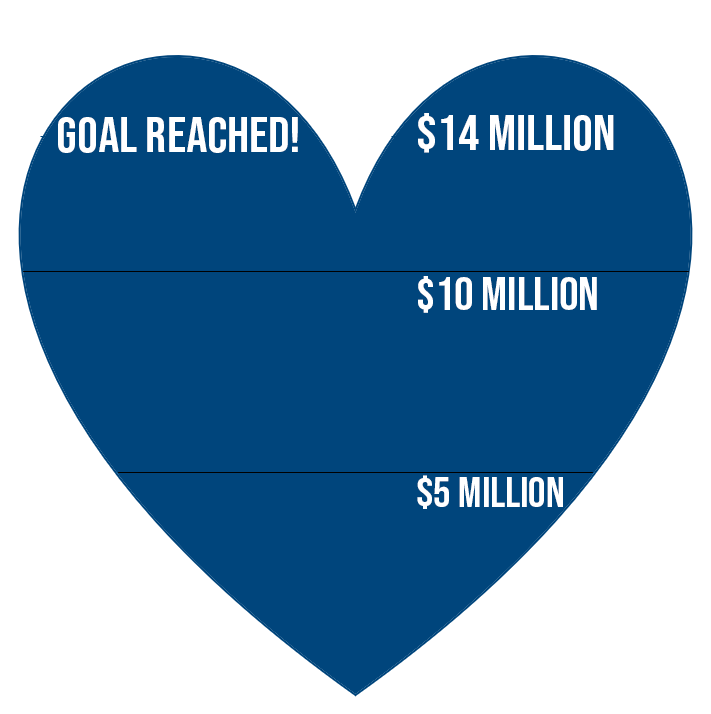
CAMPAIGN GOALS
A fund to support emergency services in the face of increasing demand.
A Wellness Shelter to provide services to people experiencing homelessness and complex health/behavioral issues.
A Healing Center to support survivors of human trafficking.
Consolidation of services for homeless and runaway youth.
Expanded women’s shelter capacity.
Investment in high impact advocacy work to advance public policy.
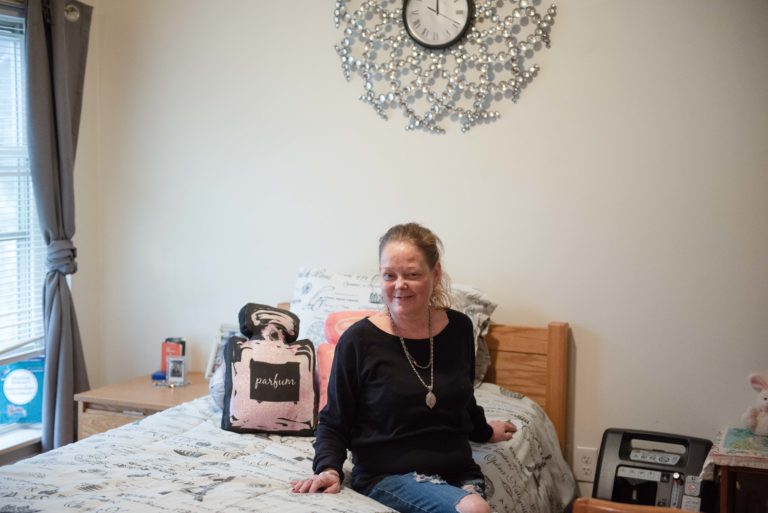
With the opening of the Preble Street Healing Center for survivors of human trafficking in 2021, we have already achieved one of our six Campaign goals! Thank you for your support.
OVERVIEW
What defines the Preble Street mission, above all, is removing the barriers people face when trying to access services in their fight against poverty. We constantly review our services as community needs change in order to most efficiently empower the people and communities we serve.
COVID-19 created historic barriers for our vulnerable neighbors, and the response of Preble Street demonstrated the strength of the agency to adapt to changes and ensure our services remain strong and effective.
Throughout public health crises and beyond, Preble Street continues to build capacity, develop new responses, and evolve to meet unique challenges — no matter what.
Over the last year, in response to COVID-19 Preble Street launched new programs to:
- provide social work services and meals to people who are unhoused
- help individuals and families experiencing homelessness return to housing quickly
- provide space for people who are unsheltered to distance and stay safe
- provide isolated space for people who test positive for the virus
Recognizing that shelters play a critically important role in public health, we received unanimous approval from the Portland Planning Board to open a new permanent Wellness Shelter. At the same time, we provided 1 million emergency meals, and we housed and provided shelter to veterans and their families throughout the state. All 15 Preble Street programs remained at full capacity to provide opportunity and hope to Mainers experiencing poverty; and to acknowledge the vital work of direct service staff, the agency provided time and a half gratitude pay, retaining a full workforce.
The barriers faced by the people we serve are numerous and complex — and often unpredictable. Gaps still remain in addressing surges in demand for our core emergency services; in dealing with the horrific realities of human trafficking; in providing an integrated system of care and safety for vulnerable teens; in meeting the complex needs of women experiencing homelessness; and in effecting systemic public policy changes.
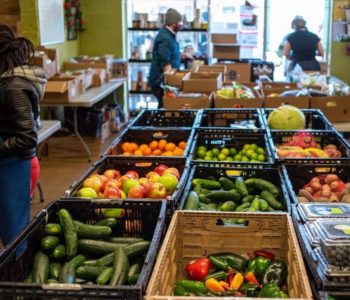
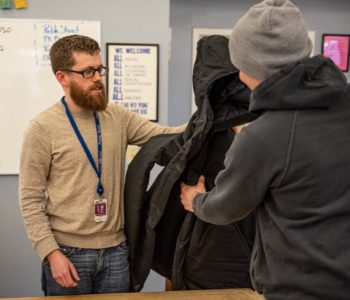
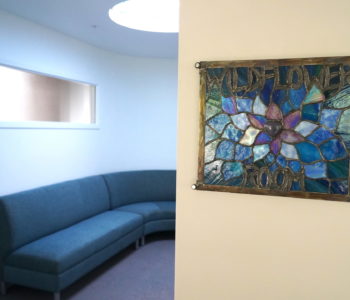
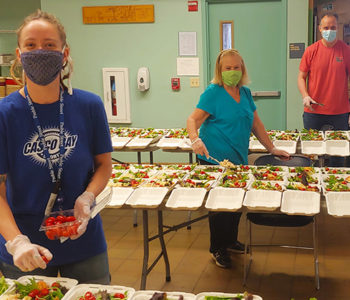
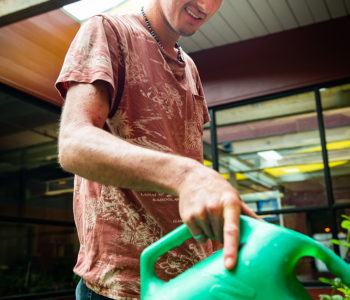
Responding to crises
The core of our mission is to respond to vulnerable individuals and families, meeting acute needs where no other options exist.
Since the onset of COVID-19, we have restructured our Food Programs operations multiple times to adhere to CDC guidance and safeguard the health of the people and communities we serve. Our Food Pantry increased from weekly to daily, growing from serving 140 families to 500 each week as more and more people lost their jobs. At the same time, we provided 3 meals a day to Portland-area shelters.
As a result, we doubled the number of meals provided this year to over 1 million. In the face of tremendous need, we will endow funds that allow us to respond quickly when issues emerge in the community, to help those in crisis when capacity is outstripped by demand. This fund will allow us to meet basic needs for safety, food, shelter, and ensure people have the opportunity to achieve stability and well-being.
Warmth, safety, and intensive services
Informed by our response to COVID-19, the Preble Street Wellness Shelter will be an ongoing part of the solution to homelessness. The Wellness Shelter will provide warmth, safety, and intensive case services to 40 men and women experiencing homelessness and complex health and behavioral issues who cannot access any other shelter.
The pandemic has shown that emergency shelters are critically important to a community’s public health and need to be smaller, wide open, welcoming, calm, and staffed by social work professionals. Within this community guests build trusting relationships that open the door for them to healthcare, treatment, housing, and hope.
Gone are the days of allowing our neighbors to sleep on mats on the floor spaced six inches apart — each person will have their own bed and will work with a professional caseworker toward stability.
Human trafficking in Maine, an increasing reality
The District of Maine — one of the smallest — was a Department of Justice Top 10 district for human trafficking prosecutions in 2019.
Preble Street first became involved in human anti-trafficking work in 2010 when youth were arriving at the Teen Center after escaping perpetrators who were using violence and drugs to force them into sex work or labor trafficking.
Individuals who are being trafficked are forced or coerced — through sexual, physical, and/or psychological violence — to perform a variety of labor, including sex work, domestic service, childcare, agricultural labor, and restaurant work.
Human traffickers trick, defraud, or physically force victims into working under inhumane conditions. Supplied with little other than drugs, they are moved up and down Interstate 95, forced into sex work at motels without seeing the light of day for weeks at a time.
In the past 10 years, working with survivors across the state, we have seen too many people suffering from horrific exploitation. Working in collaboration with partners at the US Attorney’s Office, the FBI, local police, and the district attorney, we are determined to do more to end human trafficking.
A new support system
Preble Street Anti-Trafficking Services is consistently recognized for meeting the complex needs of survivors. To expand our work further, the Healing Center will provide comprehensive services for survivors of human trafficking, including:
- Case management services and trauma therapy
- Connection to medical services and mental health counseling
- On-site services from partner agencies including employment, legal services, group therapy,
skills building, and ESL classes - A training center for workshops focused on best practices for human trafficking responses
- Activities such as yoga, art therapy, and writing
A new response
To address the tragic upward trend in homelessness in the City of Portland, Preble Street is committed to creating a low-barrier, 24-hour shelter and service center for women and is currently reviewing potential sites.
Since the closing of the YWCA in 2007, when it created a temporary shelter while developing Florence House, Preble Street has sheltered women experiencing homelessness; and the new emergency shelter for women will further our effort to replicate best practices and create safety and privacy for women living with trauma from violence and abuse.
Meeting the complex and varied needs of women who are vulnerable to assault, have been victims of human trafficking, are living with chronic medical conditions, and have high rates of active mental health issues, the Women’s Shelter will provide vital emergency services and support, including:
- Immediate short-term safety and services
- Shelter for survivors of human trafficking, in coordination with the Healing Center
- 24-hour services, meals, showers, laundry, storage space, activity room, and service hub
- A proven effective service system, partnering with health, behavioral health, case management, and domestic violence organizations to ensure a continuum of care
Consolidation and safety
We will consolidate the currently separated daytime Teen Center and nighttime Joe Kreisler Teen Shelter into one building. This expanded space will provide 24/7 barrier-free access for runaway and homeless youth while ensuring they have the safe space, resources, and skills to attain a healthy, stable future.
Teen Services provides:
- Outreach to youth on the street
- Immediate shelter and safety, three meals a day, showers, bathrooms, clothing, and storage
- Crisis intervention, case management, and connection to substance use and mental health treatment, educational and employment opportunities, and housing services
- Positive youth development activities that promote healthy peer relationships and foster independence
- Consistent contact and trusting relationships with case workers and other caring adults who help youth develop skills, confidence, and strategies for overcoming obstacles
- Transitional apartments and support for youth who are ready to begin establishing permanent independent living
Advancing public awareness and policy
Preble Street is unique in combining direct services with public policy advocacy and education, working relentlessly for social and economic justice. We do this critical work informed by — and in partnership with — the people we serve. We feel it is our responsibility to develop solutions to the systemic problems that lead to hunger, homelessness, and poverty.
To increase awareness and the public will to create more equitable and just communities, we will continue to inform policy and explore new models and partnerships that:
- Promote solutions-oriented impact through publications, research, cross-sector educational opportunities, social justice internships, policy recommendations
- Build on our extensive history of program evaluation, reports, and trainings locally, nationally, and internationally
- Advocate for best-practice service models and the public policies that support them
